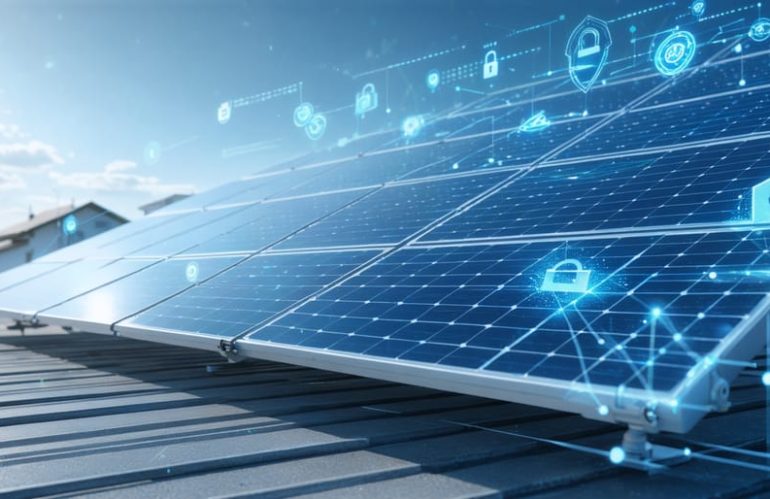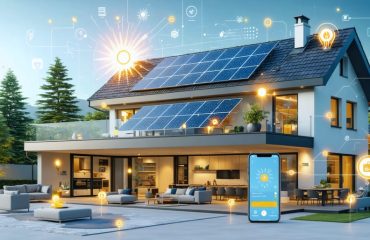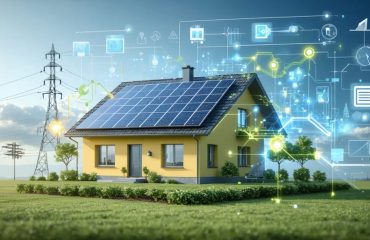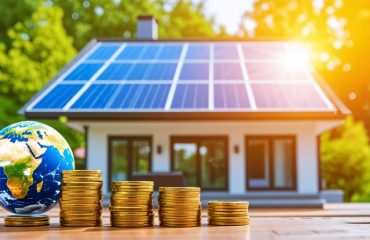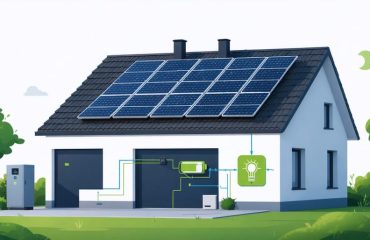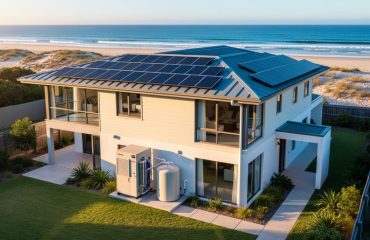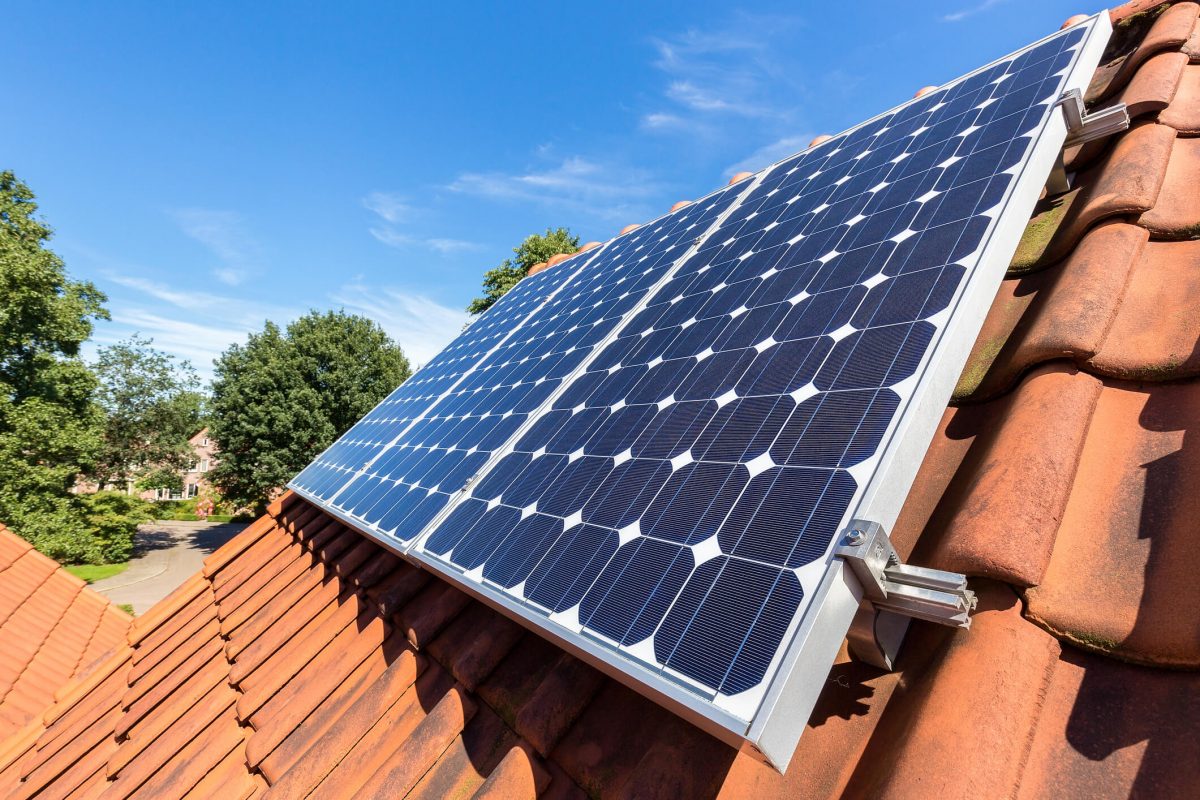In today’s interconnected smart home landscape, cybersecurity isn’t just an IT concern—it’s become a fundamental aspect of residential solar system safety. As solar installations increasingly integrate with home networks and mobile apps, they create new opportunities for energy independence while simultaneously introducing potential vulnerabilities. Modern solar systems collect real-time production data, manage battery storage, and optimize energy consumption through internet-connected monitoring platforms, making robust cybersecurity measures not just beneficial, but essential for protecting your clean energy investment.
The convergence of renewable energy and digital technology demands a comprehensive approach to security that protects both your power generation system and your personal data. From secure firmware updates to encrypted communication protocols, implementing proper cybersecurity measures ensures your solar investment remains both efficient and protected. Understanding these security considerations has become as crucial as knowing your system’s energy production capacity, especially as smart grid technologies continue to evolve.
Why Your Solar System Needs Cyber Protection
Smart Solar: The Connected Home Revolution
Today’s solar systems go far beyond simple power generation. Through advanced smart home integration, your solar setup can communicate with other household devices to optimize energy usage and enhance comfort. Modern solar inverters connect to your home’s Wi-Fi network, allowing you to monitor production and consumption in real-time through user-friendly mobile apps.
These smart systems can automatically adjust your home’s energy usage based on solar production, running appliances when solar generation is at its peak and reducing consumption during low-production periods. They can even integrate with smart thermostats, battery storage systems, and EV chargers to create a comprehensive energy management ecosystem.
The result is a more efficient home that maximizes solar benefits while providing unprecedented control over your energy usage. You can track savings, receive maintenance alerts, and make informed decisions about your energy consumption – all from your smartphone.
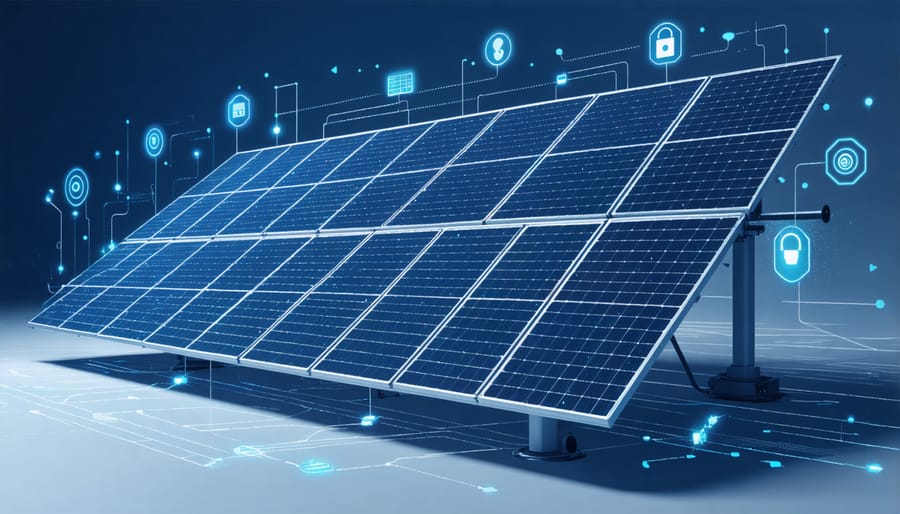
Common Security Risks for Home Solar
Modern home solar systems, while incredibly beneficial, can face several security challenges that homeowners should be aware of. The most common vulnerabilities include unsecured internet connections between solar monitoring systems and home networks, weak default passwords on solar inverters, and outdated firmware in solar equipment.
Remote monitoring apps and smart device integration, while convenient, can create potential entry points for unauthorized access if not properly secured. Data collected by your solar system, such as energy usage patterns, could potentially reveal when you’re home or away, making proper security essential.
Equipment vulnerabilities might also exist in older solar installations that haven’t received recent security updates. Some systems may use outdated communication protocols or have insufficient encryption for data transmission between components.
The good news is that most of these risks can be effectively managed with proper setup and regular maintenance, ensuring your solar investment remains both efficient and secure.
Essential Security Features in Modern Solar Systems
Secure Monitoring Systems
Modern solar monitoring systems act as vigilant guardians for your solar investment, providing real-time protection and peace of mind. These intelligent systems continuously track your solar panel performance while safeguarding against potential cyber threats and unauthorized access.
Using advanced encryption protocols, monitoring systems protect sensitive data about your energy production and consumption patterns. They instantly alert you to any unusual activities, whether it’s a sudden drop in performance or suspicious connection attempts. This proactive approach helps prevent both system failures and potential security breaches before they can impact your home’s energy supply.
The beauty of modern monitoring solutions lies in their user-friendly interface. Through secure smartphone apps or web portals, you can easily check your system’s status, receive automated alerts, and track performance metrics from anywhere. Two-factor authentication and regular security updates ensure that only authorized users can access your system’s controls.
These systems also integrate seamlessly with your home’s smart technology, creating a robust network that prioritizes both efficiency and security. By monitoring weather patterns and energy consumption habits, they help optimize your solar system’s performance while maintaining strict security protocols.
Regular automated security scans and encrypted data backups ensure your system remains protected against evolving cyber threats, giving you the confidence that your solar investment is both productive and secure.
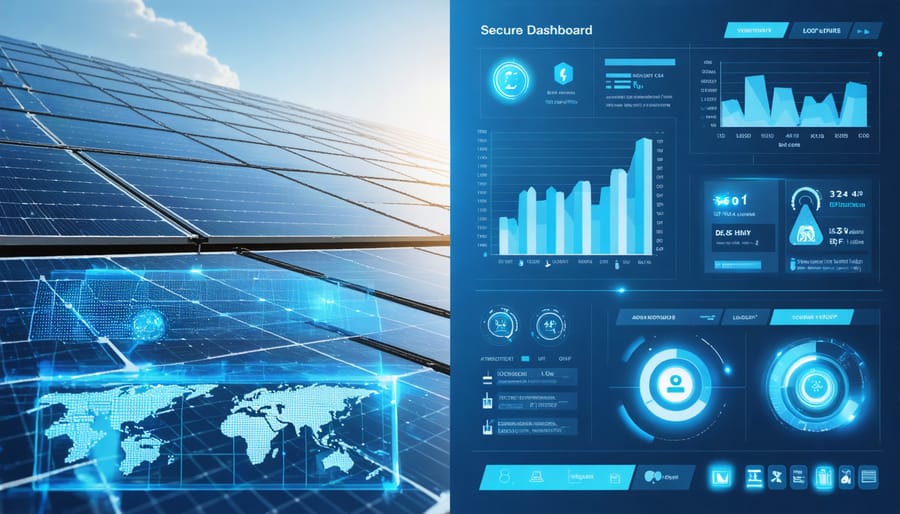
Data Encryption and Privacy Protection
Modern solar systems prioritize your privacy through advanced encryption methods and robust security protocols. Your energy consumption data and personal information are protected by multiple layers of security, similar to those used by leading financial institutions. This commitment to secure data protection ensures that only authorized users can access your system’s information.
Your solar monitoring system employs end-to-end encryption, which means your data is scrambled into unreadable code during transmission and storage. This prevents unauthorized access even if someone manages to intercept the data. Additionally, regular security updates and patches keep your system protected against emerging threats.
To further enhance privacy, many modern solar installations use anonymous data aggregation. This means your personal energy usage data is combined with information from other users before being analyzed for grid management purposes, making it impossible to identify individual households.
Access to your solar system’s dashboard is protected by multi-factor authentication, requiring more than just a password to log in. This extra layer of security helps prevent unauthorized access to your energy management system, giving you peace of mind while maintaining convenient control over your solar installation.
Remember to regularly update your system passwords and keep your monitoring app up to date to maintain optimal security. Your solar provider continuously monitors system security and implements the latest protection measures to keep your data safe.
Simple Steps to Protect Your Solar Investment
Setting Up Secure Connections
Setting up a secure connection for your solar equipment is simpler than you might think, and it’s essential for protecting your home’s energy system. Start by ensuring your home’s Wi-Fi network uses WPA3 encryption – the latest standard in wireless security. When connecting your solar inverter or monitoring system to your network, always change the default password to a strong, unique one that combines letters, numbers, and special characters.
Create a separate network specifically for your solar equipment, often called a VLAN (Virtual Local Area Network). This keeps your solar devices isolated from other home devices like computers and smartphones, adding an extra layer of protection. Many modern routers offer this feature through their basic settings.
For remote monitoring, use only the official app provided by your solar system manufacturer, and enable two-factor authentication when available. Avoid accessing your solar system’s controls through public Wi-Fi networks, and regularly update all associated software and firmware when updates become available.
Consider installing a dedicated firewall device between your solar equipment and the internet connection. While this step isn’t always necessary for residential systems, it provides additional protection if you’re particularly security-conscious. Regular security audits of your connection settings, preferably every six months, help ensure your system stays protected as technology evolves.
Regular Security Updates
Keeping your solar system’s software up to date is as important as maintaining the physical panels themselves. Just like your smartphone or computer, your solar monitoring system needs regular updates to stay secure and perform at its best. These updates patch potential security vulnerabilities and add new features that enhance your system’s performance and protection.
Most modern solar installations include automatic update features that handle this maintenance for you. However, it’s wise to regularly check your system’s dashboard to ensure updates are being applied correctly. A good practice is to verify your system’s software status monthly, alongside your regular energy production review.
These updates often include improvements to your system’s firewall, encryption protocols, and security features that protect against the latest cyber threats. They also ensure your system communicates safely with your utility company and maintains compliance with grid requirements.
If you’re managing updates manually, create a regular schedule and never postpone security patches. Many solar providers offer mobile apps that notify you when updates are available, making it easier to stay current. Remember, outdated software can leave your system vulnerable to security breaches and might affect its efficiency.
When in doubt, contact your solar provider for guidance on your system’s update process. They can verify that you’re running the latest version and help troubleshoot any update-related issues.
Working with Professional Installers
Working with certified professional installers is crucial for ensuring your solar system’s cybersecurity is properly configured from day one. These experts bring specialized knowledge of both solar technology and security protocols, helping you avoid common vulnerabilities that could compromise your system.
Professional installers follow industry best practices for securing your solar equipment, including proper firewall configuration, secure network setup, and implementation of encryption protocols. They’ll ensure all default passwords are changed, software is up-to-date, and security features are activated before your system goes live.
During installation, professionals will also help you understand how to maintain your system’s security through regular updates and monitoring. They can set up secure remote access for system monitoring while ensuring unauthorized users can’t gain control of your equipment.
Many professional installers offer ongoing support and maintenance packages that include regular security audits and updates. This proactive approach helps identify and address potential vulnerabilities before they can be exploited. They’ll also keep you informed about important security updates and patches that need to be installed.
Remember to choose installers who are certified and have experience with cybersecurity integration. Ask about their security protocols and what measures they take to protect their clients’ systems. A reputable installer should be happy to explain their security practices and provide documentation of their certifications.
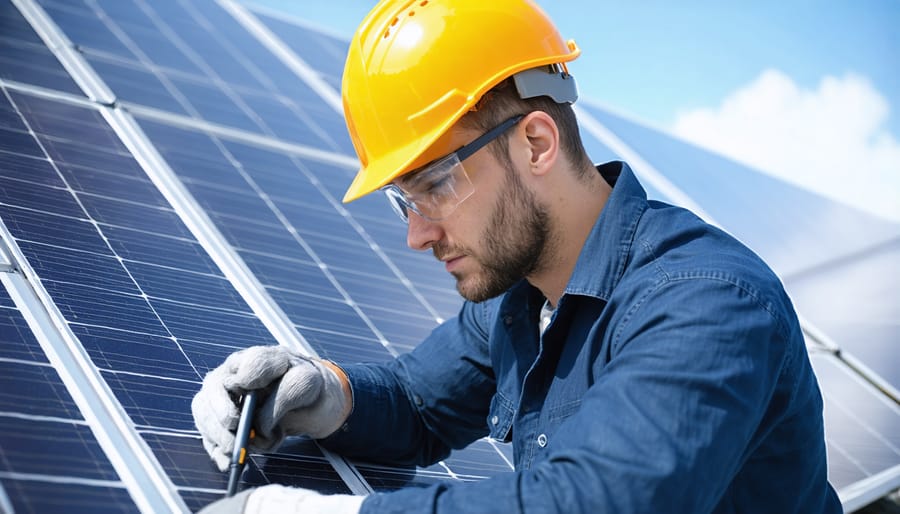
As we’ve explored throughout this article, cybersecurity integration is a crucial aspect of modern solar installations that shouldn’t be overlooked. By choosing a solar installer who prioritizes cybersecurity measures, you’re not just protecting your energy system – you’re safeguarding your home and personal data. Remember to ask potential installers about their security protocols, monitoring systems, and data protection practices. The small investment in proper security measures today can prevent significant headaches tomorrow. With the right installer and security measures in place, you can enjoy the benefits of clean, renewable energy while maintaining peace of mind about your system’s security. Make cybersecurity a priority in your solar journey, and you’ll be well-positioned to embrace the future of sustainable living safely and confidently.

